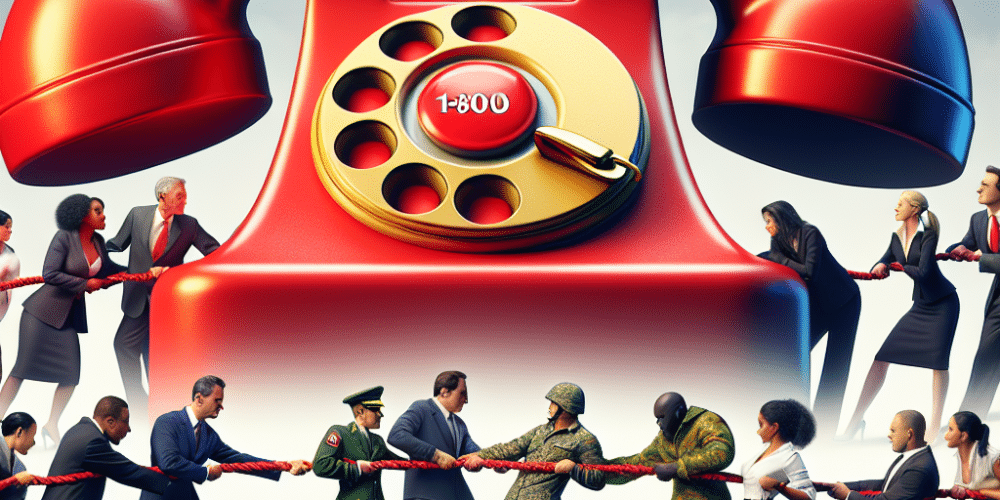Since its inception, the 1-800-GAMBLER hotline has served as a lifeline for individuals grappling with the challenges of problem gambling. However, a contentious debate has emerged regarding the management of this essential resource and the extent to which data should be collected from those who call in seeking assistance.
For decades, the hotline’s management was under the aegis of the Council on Compulsive Gambling of New Jersey (CCGNJ). This changed in 2022 when the National Council on Problem Gambling (NCPG) began leasing the number for an annual fee of $150,000. The decision was partly funded by an NFL grant, which by now has reached a cumulative total of $12.6 million.
Under the NCPG’s stewardship, the hotline was transformed into a national network, routing calls across the United States to link individuals with local support services. This shift, however, sparked friction among various state organizations, notably in New Jersey, Florida, and New Mexico. These groups raised concerns over the NCPG’s insistence on implementing data collection surveys prior to providing assistance.
The NCPG defends its survey method, arguing that the data collected is instrumental in shaping effective national prevention strategies. Nonetheless, local centers have voiced their discomfort, suggesting that these surveys are intrusive during what are often critical and sensitive interactions. The discourse revolves around the urgency of the calls, as expressed by Kandace Blanchard, clinical director of the New Mexico Council on Problem Gambling. She highlighted the grave risks, noting that individuals with gambling problems are significantly more susceptible to suicide or attempts thereof. “We don’t want to give them this long survey,” she mentioned, emphasizing the priority of immediate support over data collection.
In New Mexico, the reluctance to adopt the NCPG’s data-centric model led to calls being redirected to Louisiana. This change introduced significant barriers, particularly linguistic and cultural, affecting many callers such as native Navajo speakers. “The assistance should be immediate and culturally sensitive,” Blanchard stressed, drawing attention to the critical nature of language compatibility in providing effective support.
Similar apprehensions are echoed in other states. Candice Cookson from Ohio’s helpline emphasized the importance of maintaining caller privacy. “If they were sharing identifiable information, I don’t think people would share with us as much as they do,” she noted, pointing out the delicate balance between data collection and privacy required to maintain caller trust.
The legal ramifications of this dispute culminated in September, when the New Jersey Supreme Court ruled that the control of the 1-800-GAMBLER hotline should be returned to the CCGNJ. This decision was a pivotal moment in the ongoing disagreement, and since the ruling, New Mexico’s calls have been routed back to their local center, much to the relief of Blanchard and her colleagues.
The NCPG, however, contends that its approach has been misunderstood. Jaime Costello, the director of programs, explained that their staff is trained to prioritize the immediate needs of the caller above all else. According to Costello, data collection only commences once it is assured that all safety concerns have been adequately addressed, and importantly, any data collected is anonymized to protect caller identity.
Despite these reassurances, the controversy underscores a broader dichotomy between centralized data-driven approaches and localized, personalized care. On one hand, the NCPG’s strategy aims to develop comprehensive national solutions informed by data trends. On the other hand, local organizations emphasize the necessity of individualized care that respects the immediate and personal nature of the crisis calls.
The debate over the hotline’s management reflects larger trends in the gambling industry, where technological and strategic innovations often clash with traditional, human-centric models of care. As gambling becomes more accessible through digital platforms, the need for effective problem gambling interventions grows. The challenge lies in balancing the benefits of broad data-driven strategies with the need for personal, empathetic support that respects individuals’ immediate circumstances.
The ongoing dispute between the CCGNJ and the NCPG is unlikely to conclude quickly, as both sides hold significantly different visions of how best to serve individuals in distress. The resolution of this disagreement will not only affect the future of the 1-800-GAMBLER hotline but could also set precedents for how similar resources are managed nationwide.
As the debate continues, stakeholders in the gambling industry, policymakers, and mental health advocates remain attentive to the developments. This situation exemplifies the complexities involved in managing public health resources in a digital age, where data collection can offer valuable insights but also poses challenges to privacy and immediate support needs.
Ultimately, the path forward may require a synthesis of both perspectives: harnessing the power of data to enhance prevention efforts while ensuring that immediate, empathetic human interaction remains at the heart of the assistance provided. As one advocate put it, “We need to find a way to marry data with empathy, ensuring that those who reach out for help get the support they deserve without sacrificing their privacy or immediate needs.”

Garry Sputnim is a seasoned journalist and storyteller with over a decade of experience in the trenches of global news. With a keen eye for uncovering stories that resonate, Alex has reported from over 30 countries, bringing light to untold narratives and the human faces behind the headlines. Specializing in investigative journalism, Garry has a knack for technology and social justice issues, weaving compelling narratives that bridge tech and humanity. Outside the newsroom, Garry is an avid rock climber and podcast host, exploring stories of resilience and innovation.
















